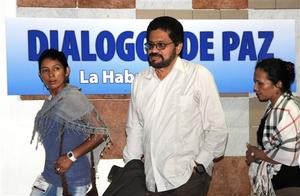Negotiating a peace accord in the midst of an armed conflict is a challenging endeavor, but one nonetheless chosen by the Juan Manuel Santos government. Last week the 60-day unilateral cease-fire declared by the Fuerzas Armadas Revolucionarias de Colombia (FARC) elapsed, resulting in the resumption of military operations. These operations were intense and included several states in the south, northwest, and north of the country. As a result, the FARC captured two policemen and a soldier. The reactions of the state, the main stream media, and the forces of reaction coincided in their condemnation of the “hostages” taken by the FARC, which of course they do not consider as prisoners of war since the state refuses to recognize the FARC as a legitimate belligerent force.

But the campaign against the rebels went beyond the condemnation of the kidnappings as the criticism expanded to discredit the peace talks. The right-wing interests championed by the former President Alvaro Uribe and his close large cattle-ranchers latifundistas exploited the situation to mobilize public support against the peace talks—putting pressure on the Santos government at the outset of his campaign for re-election.
The FARC recognized the impending challenge to the peace talks and decided to release the prisoners of war in an effort to compel civil society organizations to support the peace process. This is the nature of the negotiations in the midst of civil war. Now one may ask why the Santos government is committed to this formula of negotiation in spite of the risks that last week events put in a sharp relief?
The Santos governing team, military commanders, and the U.S. advisors are committed to degrading the military capabilities of the FARC by targeting commanders of fronts such as Jacobo Arango, leader of the 5th front operating in the department of Cordoba, who was killed last week. The objective is clear that by weakening the FARC the state and its dominant classes decrease the price of peace in terms of structural reforms, redistribution of land and income, and, most importantly, preserving Colombia’s ill-fated model of economic development based on rentier capitalism and bio-fuels.
That is why the Santos formula is risky.
Stay tuned.
Nazih Richani is the Director of Latin American studies at Kean University. He blogs at nacla.org/blog/cuadernos-colombianos.

